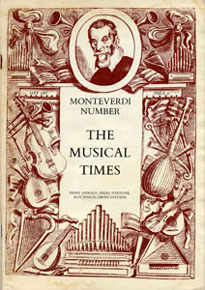
Berlioz, Master Musician
A book review by
David Cairns
© 1967-2012 David Cairns

 |
Berlioz, Master MusicianA book review by David Cairns © 1967-2012 David Cairns |
 |
Berlioz by J. H. Elliot. Dent, 21s
Readers of MT will by this time be used to the unrepentant republication of the weaker Master Musicians biographies in their original form, virtually unchanged and, like the Ghost in Hamlet, ‘with all their imperfections on their head’. And now here comes J. H. Elliot’s Berlioz, pretty well as it was when it first appeared in 1938.
It would have been too much to expect him to rewrite the book, however much one may wish he had. But one could reasonably have hoped that errors of fact would be corrected, especially as some attempt seems to have been made to do so. The new preface acknowledges a debt to Cecil Hopkinson’s bibliography (1951), yet the Catalogue of Works remains deficient. Hélène is still called a Sextet; the arrangement of the Marseillaise is still said to include soloists; the date of the orchestral version of La mort d’Ophélie is still given as 1850, and there are other misdatings; Les francs juges and La nonne sanglante are still described as lost. In the body of the book we read, as before, that ‘much more’ in the Fantastic Symphony besides the March was taken from Les francs juges and, in another place, that ‘the facts are’ that many parts of the symphony were already written and needed ‘only coordination and revision’; that Saint-Saëns was ‘never sympathetic’ to Berlioz’s music; and so on. The facts are otherwise.
A few comments have been modified. For example, in the chapter called ‘Berlioz, Critic and Criticized’ a paragraph stating that his music has never been fully accepted by music-lovers has gone and the space has been filled with a passage which acknowledges the Requiem’s ancestry in the huge musical ceremonies popular in revolutionary France and praises Berlioz for his imaginative use of the tradition. But in general Elliot sticks to his opinions, above all to the claim that Berlioz is a peculiarly patchy composer. All composers are unequal, he concedes in the preface to the new edition; but Berlioz is more unequal than others.
Elliot is perfectly entitled to his opinion; but as the pages go by it begins to take on the rigidity and intolerance of a dogma. At every turn we are assured of the impossibility of an unbiased observer’s accepting any major Berlioz work without serious qualifications; and throughout there is the assumption, sometimes implicit, often explicit, that anyone who does not react in this way is an uncritical partisan—and furthermore, an addict: for the intense melancholy expressed in pieces like Sur les lagunes and Au cimetière will ‘act on the mind with the effect of a powerful drug—if the listener is prepared to yield. The proviso is important’. The point is taken up again in a characteristic passage on the Requiem: ‘One must yield to the hypnotic spell in order fully to experience what Berlioz intended one to undergo. Whether this autohypnosis is any more desirable in music than in other spheres of life is another matter’. From Elliot’s analysis of this work it is clear that he at least has managed to preserve himself from corruption. The charnel-house atmosphere he finds in it is remote indeed from the ‘visionary gleam’ described in Wilfrid Mellers’s masterly chapter on Berlioz in Man and his music.
There are thoughtful, balanced things in the book. But side by side with an Elliot who makes perceptive and illuminating comments on the music there is an Elliot who appears impelled to find fault. One’s objection is not that he criticizes but that he criticizes compulsively, almost mechanically. He seems constantly on the look out for weaknesses and eccentricities, and he announces their presence not so much because he has actually found them as because he assumes they are there. Faust ‘contains pages of dull and undistinguished music’ (which they are is not specified). Even ‘D’amour l’ardente flamme’ is marred by the grotesque effect that the middle section usually makes. What singer, one wonders, can have prompted that observation? In the case of L’enfance du Christ (a very unequal work, unhappily) he makes the somewhat surprising revelation that his account of it was written ‘without benefit of a single hearing’. After this one may be forgiven for speculating what experience of the music went into his detection of ‘pages of monotonous, uninspired and mortally fatiguing music’ in The Trojans. Of all Elliot’s strange judgments this now seems the strangest. It is, however, necessary to his theory of a Berlioz in premature creative decline and thus to the last prevented from composing a really great work.
The remark, apropos of Benvenuto Cellini, that ‘it is probable [my italics] that the best of the opera is preserved in the Roman Carnival overture’ is unfortunately typical of the author’s approach and style of writing. The fondness for trying to pretend that a personal opinion is not a personal opinion by the insertion of some pseudo-judicious qualifying word is much in evidence; but it reaches a climax of absurdity when, speaking of Beatrice and Benedict and its skilful concealment of lack of invention by sheer technical resource, and comparing this with what Wagner did ‘on a more imposing scale in parts of Parsifal’, he adds: ‘and, perhaps, of the Ring’.
The narrative of the life is quite efficiently done, but it is so brief as to be positively potted. Some of the middle years flash by in a few sentences. The book should have been longer than it is (only just over 200 pages all told). There might then have been more facts to accompany the opinions.
DAVID CAIRNS
![]()
* We are most grateful to David Cairns for granting us permission to reproduce this article on this page.
We have transcribed the text of the article from The Musical Times, July
1967, a copy of which is in our collection. ![]()
![]()
The Hector Berlioz Website was created by Monir Tayeb and Michel Austin on 18 July 1997; this page created on 1 April 2012.
© Monir Tayeb and Michel Austin. All rights reserved.
![]() Back to Berlioz: Pioneers and Champions
Back to Berlioz: Pioneers and Champions
![]() Back to Original Contributions page
Back to Original Contributions page
![]() Back to Home Page
Back to Home Page
![]() Retour à la page Berlioz: Pionniers et
Partisans
Retour à la page Berlioz: Pionniers et
Partisans
![]() Retour à la page
Contributions originales
à ce site et autres articles
Retour à la page
Contributions originales
à ce site et autres articles
![]() Retour à la Page d’accueil
Retour à la Page d’accueil